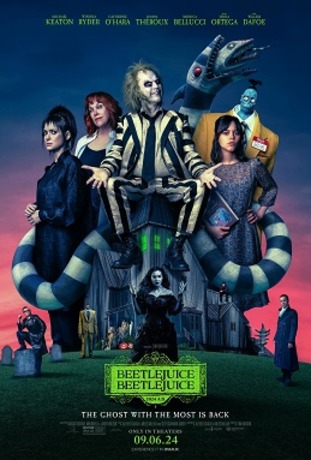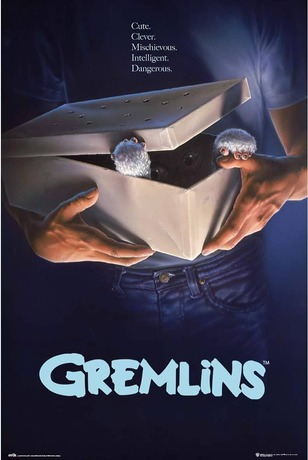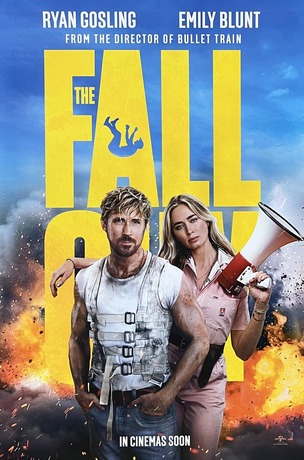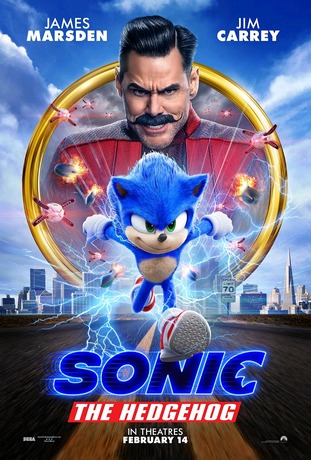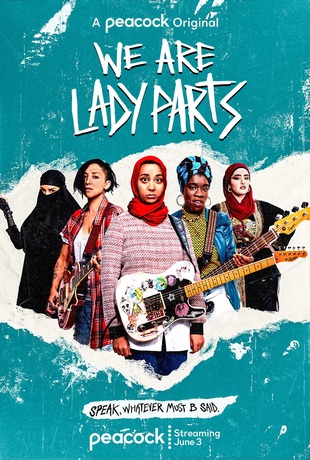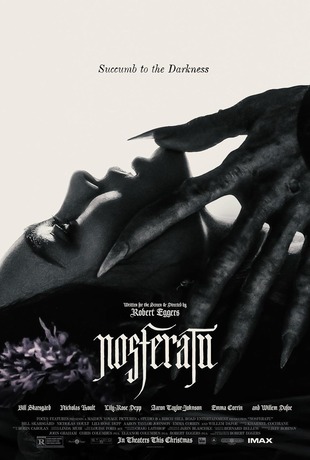January 2025 Watch
Thursday, 6 February 2025
What is there to say about this month? As always, January has felt like a year itself. Adjusting to different weather is the most difficult thing for real. I got a new haircut that makes me look mysterious and cool. I haven’t listened to music in a month except for the weather and the 2017 album Broken Machine; I’m being hyperbolic with this one. Most of my days have been spent working on final assignments, but I’m finally done with them. I made really good pasta last night.
In terms of site-specific updates, I’ve decided to only include first watches on these responses and I’m adding posters for visuals, neat! If you click on the posters it will take you to the image source. As you can likely tell, I also updated the site theme for most pages. I’m still deciding if I want to keep the old theme for my old posts or update those as well.
Beetlejuice Beetlejuice (2024, dir. Tim Burton)
So I definitely predicted my response to this movie, but it didn’t stop me from giving it a try. For one, I liked both Tim Burton movies I watched last year, the original Beetlejuice being one of them. For two, I like both Jenna Ortega and Winona Ryder. And for three, I promised my sister we could watch it while I was visiting home in December. We both didn’t like it… But I think it’s really helped me to refine what exactly I look for in a movie, in particular in a sequel-reboot, which will be useful for my reviews this year.
Beetlejuice Beetlejuice is the sequel to the 1988 film by Tim Burton that follows Lydia Deetz in her middle age, and her daughter Astrid. The two are navigating a tumultuous relationship as Lydia’s husband / Astrid’s father Richard has died, and also so have Lydia’s parents (during the course of the movie). While Lydia hosts a ghost reality show and deals with a manipulative partner, Astrid does not believe her mother can see ghosts; of course, she slowly begins to see them during the movie. One of these is a teenage boy ghost who tricks her into trading her life for his, and Lydia must help her daughter escape from the Netherworld. To do this, she enlists Beetlejuice to help her, but he is also dealing with his ex-wife who is coming for him and killing(?) dead people in the Netherworld on her hunt. Willem Dafoe is an actor-police officer.
This movie is convoluted, too fast and busy, and treats its audience like they’ve never seen a film before. For one, there are way too many details that don’t pan out in a way that matters. There are moments of different visual styles (claymation and classic black-and-white horror movies) that don’t amount to much beyond appearance. There are genuinely so many characters; it is completely unnecessary and felt like the filmmakers just wanted to fit in as many cameos as possible. Despite the massive amount of things going on in this movie, it moved so quickly; everything was so insubstantial, though, that it didn’t feel like the audience was missing out on anything. Things were simultaneously resolved and not; we were suddenly at the climax of the film and I was momentarily tricked that nothing had happened to lead up to this despite the overwhelm I felt from everything that led up to this. And perhaps related to this, it treats its audience as if we are incredibly stupid. Multiple times the characters explicitly told us where they were located (in the model, on Saturn’s moon) as though we can’t figure it out ourselves based on visual cues.
There were other smaller problems, like the visual style and effects being relatively boring and uninspired; this, however, is a criticism that is undermined by a strong visual legacy to draw from. Even while the execution lacked greatly, the foundation was strong enough this feels like a less pertinent critique. In a similar vein, the reliance on character tropes and standard plot beats helped to mask bad writing just by nature of them being so formulaic. So for example, the plot felt wrapped up with Richard’s conversation with Lydia and Astrid, telling them to mend their relationship, despite the fact that he hadn’t been present at all (nor was his loss a character on its own) and that we didn’t get to see anything substantial change for Lydia and Astrid, nor their dynamic. But it decided to be so standard in its storytelling that it just sort of melts away as a small criticism in the face of so many others.
As for what it does as a sequel, I can’t even say the film knew it was one. There were so many moments of reference to the original film I was genuinely ready to turn the television off. At the same time, though, it felt spiritually (no pun intended) entirely divorced from the 1988 film. The way the characters were developed for the modern day felt baseless and in fact like they had been chosen randomly. The complete lack of substance to tie these decisions together made the film feel somewhat soulless. Mainly I was struck by Lydia perpetually dressed in a recreation of her schoolgirl outfit; I thought this fit the way her relationship with her boyfriend-later-fiance put her in this state of dependence. You would think this would say something about grief or being raised by ghosts, but it sort of didn’t (even though I think the movie was going for the former).
This movie is much too heavy in its use of tropes and standard plot beats; when these are used at their best, they are tools to help communicate complex ideas in a succinct way, or baselines to create subversions. In this movie, they genuinely felt like everyone was too disinterested to create a story they cared about, every step of the way. It was boring, unfunny, and lacked substance.
Gremlins (1984, dir. Joe Dante)
I was genuinely shocked at how much I enjoyed this movie; I’ve put it off for over a decade in the assumption that I wouldn’t like it and I couldn’t have been more incorrect. This is a really fun film, and I found myself enjoying it quite a bit. Not only that, but it worked thematically and stylistically well.
Gremlins opens as a standard Christmas movie following Billy Peltzer. For Christmas, Billy’s father, an aspiring inventor, steals him a mogwai, a fantasy creature he sees in a shop that the owner will not sell him. Billy names him Gizmo, who is shockingly cute and loves movies. There are a few important rules for Gizmo, which Billy tries to keep but ultimately they all end up broken. Namely, when Billy gets Gizmo wet, he multiples to create new mogwai, and when those mogwai eat food after midnight, they turn into gremlins, reptile-like versions of themselves who wreak havoc on Billy’s hometown. Essentially the gremlins are incredibly violent little guys who terrorize the townsfolk if they don’t outright kill them. In the end, our human heroes manage to vanquish the gremlins, but Gizmo’s true owner takes him back, criticizing Billy and his family for treating him this way.
If I’d known this was a Christmas movie, I would’ve watched it like a week earlier, but I did not. However, because it was still during the holiday season, I was prepped for holiday movie tropes. I think what this movie did with them was really interesting. Essentially it starts with the set up to a typical Christmas movie plot: rude neighbor, wealthy person in town exploiting the people who live and work there, a little romance. And while these plotlines are brought to conclusion, it is done so with a more action- / children’s-horror-typical approach. That is, many of these people are killed by the gremlins; the specifics of how their plots resolve are left entirely up to the audience’s imagination. The way that the movie shifts from traditional Christmas movie to an invasion movie is genuinely supremely captivating and surprising. The lack of actual resolution for these plots makes the shift all the more apparent; this is not a Christmas movie with an action-focused plot, but an action movie that occurs at Christmas.
And unlike the movie I reviewed in my December post, that this movie takes place at Christmastime is quintessential to its themes. Aside from the genre shift which is just plain fun, it has this idea of commenting on, admittedly broadly, Western civilization and its use of nature. I think that the theme-explaining line we hear at the end of the movie is putting it too broadly and inappropriately magically, but the movie itself is fairly succinct in what it wants to say. That the mogwai and later gremlins Gizmo produces draw their personalities directly from the movies he adores seems so poignant. The parodical elements of the plot fit really well into this sort of reaction to movies quite generally; it’s very clearly a critique but at the same time bears no ill will towards movies. Obviously the enjoyment aspect of this film is critical in this—that is, literally it is a fun movie to watch. Seeing these little fantasy creatures enact film tropes while watching a film that makes incredible use of tropes, is genuinely enjoyable. There is no disdain in this commentary, but the commentary is still undeniable. It walks an incredible balance between the two. That it takes place around Christmas is a perfect example of this: it’s emblematic of this inherent critique at the same time it’s clever about how it uses the setting.
I was especially impressed by how earnest the movie was in its message, as it was so ironic in other aspects. At the end of the movie, Billy has to say goodbye to Gizmo. It’s remarkably adamant that Billy’s home is not the place for him, and while it’s sad to watch him leave, it makes sense. There’s not a moment to undercut the movie’s themes as it fully follows through with them. And I really appreciated this. I feel like a lesser movie would’ve had Billy apologize or Gizmo ask to stay with his family, and while I would imagine something along those lines happens for the sequels, this movie was remarkably coherent and concise. In this way, the film turns the inherent fears present in an invasion movie on their head; I think there is definitely an orientalist argument to be made in criticism of this movie, but in the meantime I’m interested in how the film eschews those typical fears. It uses an invasion-type narrative to critique behavior within a society, rather than worries about behavior outside it. I think that’s a really interesting way to respond to this type of narrative that I’ve not really seen to the same extent elsewhere. It’s probably the main reason why I liked this movie so much—I was expecting all the main beats and ideologies of invasion-based horror and instead what I got was an intentional commentary on that very narrative structure.
I don’t want to make it seem like this film is all didactic messaging; it’s not like that at all. It is a truly fun set of action-horror scenes made for children that makes clever use of genre and tropes. I really have to recommend it, although I might suggest waiting for December unless you’d like to watch a Christmas movie any other time of the year.
Fall Guy (2024, dir. David Leitch)
This movie has been on my list to watch since before it came out; I thought the trailer for this movie looked so fun. It had everything I enjoy: comedy, innovative action sequences, and it’s about making a movie. I am really glad I finally got the chance to watch it because it was a lot of fun.
Fall Guy is about Colt Seavers, a former stuntman for action star Tom Ryder; following an injury on set, Colt retired and broke up with his girlfriend at the time, Jody. Months later, he receives a call from Gail, Tom’s producer, informing him Jody is directing a movie and wants him to perform stunts for it; when he arrives, though, it becomes clear Jody was not aware of this. Gail’s actual motivations are not for Colt to do stunts at all, but in fact to find the missing Tom. During the search, it is revealed that what Gail actually wanted was for Colt to take the fall for a murder committed by Tom. In an action-packed finale, Jody and Colt and the gang plan to trick Tom into confessing his guilt.
Here’s the thing… the first ten minutes of this movie are not great. They’re expository in what I think might be trying to be a tongue-and-cheek way, but it does not hit whatsoever; however, if you can get through that, the rest of it is solid. It was funny and enjoyable, and a nice reminder that I can like action and comedy movies. For whatever reason, quite possibly due to my lasting illness in the earlier part of the month, I could not figure out where the movie was going to go. Like, the finale I managed, and some of the beats, but the dual definition of “fall guy” was fully shrouded from me until it was explicitly said in the movie. Despite this, I thought everything in the movie fit well and made sense; it was a me thing.
My biggest criticism for this movie was that I wished it was cut down a little. Both the runtime and jokes could use some polishing; I think there’s an argument for so many things happening in the plot as well, but I won’t make it since I didn’t personally find an issue with it until I was writing my summary going, “This sounds like a lot of details.” But I don’t necessarily think that’s a bad thing. It’s a small fix, but something to keep in mind that it occasionally drags, but not a bunch.
Other than that, I don’t have a whole lot to say about this movie. Yes, it was a fun time, but that’s really all it was. I don’t want to present it like it’s something that it’s not; honestly I was just enjoying an action movie that didn’t really focus on the military all that much and had jokes. I will fully recommend it if you’re looking for something light and easy.
Sonic the Hedgehog (2020, dir. Jeff Fowler)
I was genuinely shocked to watch this and realize I had watched it before, because I was utterly convinced I had not. I did at one point wonder if I had not in fact seen it before and the movie was just so reliant on other films as inspiration that it merely felt like I had. I’m not convinced of this, as much as I will gripe over that aspect of the movie quite a bit, and I decided to include my response anyway because I really thought I hadn’t watched it when I started it.
Sonic is an adaptation of a video game character into an American action family comedy movie. The character Sonic lives alone and fantasizes about this cop in town, Tom, who likes donuts (as friends) and wants to move to San Francisco. Because of his powers he captures the attention of Dr. Robotnik; he also loses a bag of rings that makes portals and befriends Tom. Sonic and Tom go on a road trip to San Francisco to get the bag on which Tom is labeled a domestic terrorist; when the eventually achieve their immediate goals, they also decide they would like to be a family, abandoning their plans to move from Tom’s hometown.
So I didn’t like this movie. I don’t know if it’s because of the movie or because I wouldn’t like Sonic, but I have a guess. Basically I just found it incredibly generic. I keep describing movies and shows like this, which is difficult because I want to be limited in how often I use that criticism, but it’s the only word I can think of for this movie. Unlike some of the other things I’ve said that about in my reviews, I’m not talking about the style here (I think that argument bears weight but isn’t my main issue with the film), but the narrative itself.
In moments like this I come back to the reason I don’t have the exact same vitriol for adaptations that a lot of people do, which is that it allows creators to do something really interesting with the source material. And I don’t think this movie did that. Quite literally, it placed this character into a deeply basic storyline with all the genre markers of the movie it was, and I know I love genre, but maybe just not this genre. It just felt like such a safe choice, but also a really boring one; and I can’t act like I know if Sonic usually is like this, but if he is I probably wouldn’t like him then either. Just the lack of any distinctive traits made all of the characters difficult to connect to; it felt like an everyman story and an everyman plot and just didn’t really say anything that interested me.
Speaking to the lack of character in Sonic (and this criticism definitely applies to Tom and the secondary characters as well), the biggest trait he demonstrated was that he had a lot of energy, which I don’t think is a personality trait. The amount of energy a character has can be a legitimate way to view them while making something, especially considering things like chemistry with the other characters, but it’s not a way to flesh them out, a perspective on the world, or something that reveals anything about them. With a narrative that relies on emotional journeys for the characters, that this lacks is off-putting. For example, we have this character that’s motivated by caution until he’s not, and he’s going all in on everything he wants to do. To some extent it’s explained by the narrative, but we don’t see a meaningful change so much as a meaningful flip. Why is he suddenly lacking all caution or apprehension?
I’m not going to lie, I’m planning to watch the next two movies. Mainly because I think Shadow is really cool and I want to see him in a movie even though he is played by Keanu Reeves. I don’t anticipate I’ll like them very much, but if I have strong or new opinions maybe I’ll write a review, who knows? Overall, I just didn’t think this movie was funny enough to make up for the lack of true emotional depth; I also was really not a fan of the casting basically at all. Sorry, James.
We Are Lady Parts (2021, created by Nida Manzoor)
I watched this show looking for something straightforward to view during breaks from my final papers, and it certainly delivered. It was a funny, engaging show that I’m glad I took the time to see.
We Are Lady Parts is the story of Lady Parts, an all-women Muslim punk band. The first season primarily follows PhD student Amina, a folk-loving people pleaser with stage fright as she is added to the band, and Saira, the band’s passionate frontwoman who leads them on their journey to minor fame. The second season opens up a bit more to the rest of the band, exploring their personal stories while integrating more band-typical plotlines like dealing with fame and restrictive record labels.
I was a bit hesitant going into this show because even though I’d heard it was amazing, band stories are really not my thing. I grew up in that era when every kid and teen show was trying to make every character a musician and I never found that particularly compelling. This show, however, definitely made me reconsider that. In the end, I decided that I’m still just not a fan of that style of plotline, as when they came up I found myself bored by them, but I think the show is quite good regardless.
Its main strengths were the characters themselves, who were funny and captivating. I kept watching the show even as it became more band-focused because of the dynamics the show had established between them. Also, the show is really funny. I have to shout out Anjana Vasan, who I watched the show for in all honesty. I think she’s so charming and she plays the roles I’ve seen her in with this kind of “adorkable” vibe but quite updated. And I was so impressed by the rest of the cast as well; I often find in comedies that I have an actor or two I’m not a huge fan of, but I didn’t for this show.
The fantasy scenes as well were just so delightful; I was not at all expecting them for this show and I was enamored. I was especially pleased when the fantasies extended to not just be Amina’s, but other characters’ as well. When it comes to otherwise fairly realistic shows that have these fantasy sequences, you mainly see them from one character, and that it’s more than just her is really different and exciting. It helped to emphasize just how Amina related to them in addition to the music in a way that was deeply rewarding.
The second season faced a few issues, chiefly in the writing. There was a distance I felt from the jokes, which were not as strong as the first season. The particular quality I struggled with was how they seemed very online. My main issues with this season though was the increased focus on the band and the loss of footing with pacing. It was difficult to get an idea of the timeline and the band became a separate character for the episodes to be structured around. This meant less time for the members of the band as individuals, and even when they got storylines, they still took a backseat to the band as a whole. This was a marked difference from what made me so interested in the first season, which spent more time with the main characters and when it did think of the band, it was as a group rather than its own entity. With that said, the characters themselves were quite strong, so I was motivated to keep watching to see where their stories went.
Momtaz’s story is a good example of the problems I found with the second season’s narrative. After spending a good portion of the season attempting to find gigs to raise money for Lady Parts and engaging with a young emerging band, Momtaz leaves the group and starts her own record label. Once Lady Parts finds partial success with a different label, they return to Momtaz, who has in her absence established a solid foundation for their careers to continue. This largely being resolved off-screen feels practical, but frustrating. That we see Momtaz have a realization for her goals is pretty much all we get of this development, and it feels more contrived than earned—by her or the rest of the band.
More broadly, the band members’ resistance to this emerging band frankly felt annoying. The perspectives they took on felt a little childish at times, which made some scenes genuinely difficult to watch, and specifically in a dissatisfying way. In addition, the time devoted to establishing their music in relation to punk as a genre felt strange and out of place. In fact, it made me question the whole show’s approach to music; the personal approach seemed a narrative choice until it didn’t, and the show was justifying itself to the audience. I really am not a fan of this type of explanation and it felt really out of place.
With the exception of my issues with the second season, I really liked this show. It filled the exact purpose I needed from it and it was just very sweet overall.
Nosferatu (2024, dir. Robert Eggers)
We can blame this movie for why my reviews took so long this month. It took a while for me to be able to articulate my thoughts on it, and not in a satisfying way. I think I wanted to see something in it that wasn’t there, and the more I reflected the less I enjoyed it.
Nosferatu is a remake of 1922 film Nosferatu: A Symphony of Horror, which is an unlicensed adaptation of Dracula. It mainly follows Ellen, a woman who deals with visceral visions and more generalized melancholy. Ellen is newly married, though she is staying with some friends as her husband is away doing Dracula-standard real estate things. These real estate things culminate in Count Orlok arriving in Wisburg along with the plague, which is on the ship he arrives on. The crew gathered throughout the movie plot a way to defeat Count Orlok, a plot that involves Ellen sacrificing herself.
I’ll start with the things I liked about this movie. For one, the costumes were gorgeous. I was consistently unable to tear my eyes away from the stunning pieces on screen and I absolutely loved the detail put into them. I enjoyed the cinematography, although it occasionally got much too interested in transitions, at times making me dizzy in the cinema. The color grading was interesting and beautiful and I enjoyed it quite a bit, though the lighting itself was a perfect example of too-dark movies, as it was difficult to see even in a perfectly dark room. I was really interested when Friedrich’s family died, as I thought it tied into the abuse theme really well; this was perhaps the moment when that theme was at its strongest. Following these positives, everything after was underwhelming.
For one, I was so excited to see a Gothic movie; I love the Gothic, both as horror films and as Romantic-era novels, and while Dracula itself has never been my favorite, I was willing to give it a try. And I think what it does stylistically is basically Gothic, with the performances and visuals and, on a superficial level, the themes. But that is true merely aesthetically; when you actually start to unpack the themes and what the movie is doing, it falls flat. That is, the placement of the abuse allegory in the story as a grotesque happening in a stunning yet problematic setting appears Gothic in nature, but the way the movie communicates that does not necessarily do so in a Gothic manner.
My primary issue with this is the lack of ambiguity. There is a very clear theme of abuse that is critical to the film, but its main technique is barely even an allegory in its clarity, the themes are unquestionable and obvious, and not only that but that single theme is really all it’s interested in discussing. There is a strange lack of complexity the movie demands even as it wants to discuss a complex topic, and I think that’s because it goes about this goal in such a direct manner. To add onto this, it makes explicit these themes that are implicit to the Gothic and to the specific story it is adapting; it doesn’t do anything new with them, just sort of artfully instructs you on how to understand it. And that’s… uninteresting to me. I’ve specifically sought out this issue I was having, and I found a lot of praise that the movie subverts the Gothic trope of a beautiful evil. But if that’s the case, I have to ask: Why make a Gothic film? Even then, my question is disingenuous, because I don’t think it does subvert the Gothic. I think it does the exact same thing as the Gothic but much less effectively.
This one-dimensionality in terms of theme came about with how it treated this theme of (and I’m simplifying it here) pleasure existing within abuse. But as I mentioned, these are implicit themes in Gothic—the space between beauty and horror—and making them the main message of the movie almost reduces their significance. It does this with its method, too, turning Count Orlok into something entirely frightening, bringing with him plague and pestilence. Ellen’s complex feelings about the situation are explored, but there’s a barrier there between her and the audience; that is, we hear about the complexity, but we only really see the negative effects much later. The ending of the film is similarly insubstantial; it should’ve tied this allegory together, but it prioritizes an interesting visual over a cohesive story. The movie is doing the most basic thing a Gothic story can do, but without any of the subtlety or glamour of the Gothic as a genre. The film is so simplistically constructed that it has no teeth. In general I would say most stories can't be boiled down to one theme or even arc, but this one just really went all in for a singular reading, and didn't even do a particularly interesting job.
I struggled with this reaction to the movie for so long because of how it orients itself in relation to the Gothic genre. It clearly loves it, at least stylistically. The cinematography and amount of homage to the genre prove this adoration. And yet, it holds your hand through the theme in a way the Gothic rejects. I genuinely came out of my discussion of the movie feeling like the filmmakers loved the genre but didn’t think their audience could understand it, and I think the—even potentially unintentional—condescension that involves is too big a pet peeve for me to have enjoyed this movie. I’m being a bit hyperbolic here, and I want to insist that this sense of condescension was my experience watching the movie and not the intent, but either way it destroyed my opinion of this movie.
I knew while watching the movie that I liked it enough, but it was unlikely I would want to watch it again. At that moment, I was more focused on just how boring I was finding the movie, but now I think there is a little more to what bothers me. After so many poor adaptations (and adjacent types of movies) this month, I was just really over it. I feel like the best place to play this movie is in the background of a Halloween party; it has solid visuals, but if you want to watch something thematically or structurally Gothic—or even substantial—then you should probably look elsewhere.

